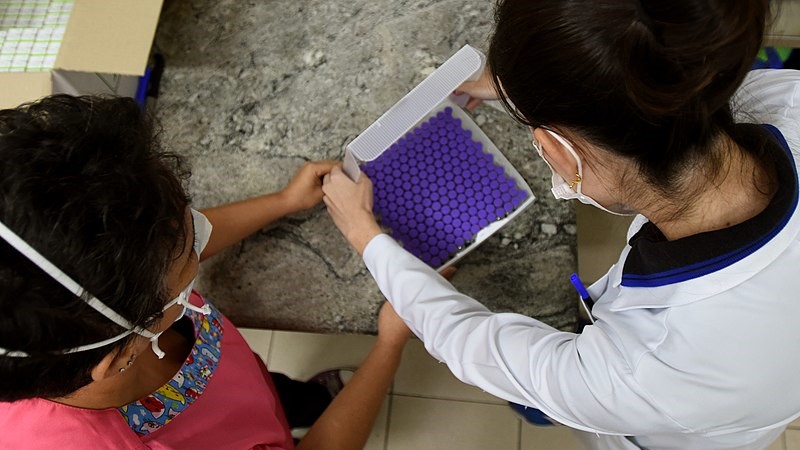Anushna Jha uses Bihar, India, as an example to understand the challenges posed by technology-enabled education as countries look to continue the teaching and learning process in times of emergency.
Schools in about 188 countries are currently shut owing to the global Covid-19 pandemic. There is discussion around how to continue the teaching-learning process in these times of emergency. Many schools have employed online learning tools to enable student-teacher interaction. Platforms like Microsoft Teams, Zoom and YouTube are being used to upload and view teaching content, conduct live lessons, and give and evaluate assignments.
Here, I flag some fundamental challenges to viewing technology-enabled education as the magic bullet that shall allow the education process to carry on uninterrupted in current times. I include findings and reflections from my recently concluded qualitative primary study where I attempted to understand the nature, extent and forms of parental involvement in schools. The field work was carried out in ten schools run by the state government of Bihar in India. Around 40 key informant interviews were conducted with principals and teachers. Focussed group discussions were held with over 750 students.
Barriers of Access and Connectivity
Many children have homes where television and internet facilities are not default features of a household but luxuries that they aspire to have some day. When we turn to digital learning, it is important to note the background and situation of children for whom having the pre-requisites of digital learning is not a given. Continuous supply of electricity, availability of a device with stable internet connectivity, basic digital literacy among students are some. There is huge digital divide that exists, and one that is being brought to the fore as we look towards technology in these times of crisis.
Lack of Teacher Preparedness to Use Technology
Research studies have pointed out the importance of knowledge among teachers on how to use technology in the teaching-learning process in order to make ICT interventions in education effective. The capacities of teachers to conduct classes online, ensure that existing online learning modules are being completed by students, check for understanding using virtual platforms cannot be taken for granted. Without adequate training and support, the feasibility of which under current circumstances is questionable, expecting teachers to seamlessly move to online platforms would be unreasonable.
Parent-teacher (dis)connect
Even if we were to assume that the challenges of access and connectivity were resolved, there is a question of how to ensure that children get an environment conducive to learning. Small but significant prerequisites include a quiet space where children can engage with online classes with no interruptions. This would need a certain understanding between parents and teachers so that they co-create an effective learning space for children. Even during pre-lockdown times, this was a major challenge. Most teachers interviewed during my research felt that it was very difficult to make most parents understand the academic issues their child was facing and that they needed to be involved. Many believed “parents assume their job is done the moment their child is enrolled into school”. They nevertheless shared that most parents, on one occasion or the other, had said that they wanted a better life for their child than the one they were living and had requested teachers to guide their children. However, parents did not see much of their role except in enrolling their children in school, and registering them for external tuitions. 72% of the student respondents went for tuitions after school. On the other hand, less than 40% were asked about their day at school by either of their parents. Most principals and teachers shared concerns about very few parents attending parent-teacher meetings. They alluded this to both lack of time, as most parents were part of the unorganised sector where not going to work on time meant sacrificing the day’s earnings, and the lack of interest in knowing about their child’s academic progress. Even when they came, parents seldom asked any questions and wanted to “quickly sign on the attendance sheet and go back”. These insights from teachers pointed to a disconnect between them and the parents; both thought well for the children, wanted to help them succeed, but hadn’t figured out a way to work together towards that yet. This disconnect between parents and teachers is likely to act as an impediment in using homes as primary sites of the schooling process.
The Socio-Economic Disadvantage
To add to the inequalities of access, connectivity and relationship with the school, the lockdown has led to half a million migrant population to leave cities and go back to their native towns and villages. The current crisis has left no semblance of normalcy for them, as daily sustenance is a major cause of concern for many. Expecting that they should find ways to make their children digitally connect with school or teachers and participate in online classes would be arrogant and irrational.
Gender Gap
In the current situation, girls face a compounded predicament. In addition to suffering at the hands of the socio-economic disadvantage their families have been exposed to, the lives of girls have been affected in more ways. For many of them, the lockdown has meant an increase in domestic responsibilities. During my research, more than half the girls interviewed cooked meals for their families before coming to school in the morning. Some of them also got delayed in reaching school on a regular basis because they had household chores to complete before leaving home. For many girls, the hours they spent in school ended up being the only time they had to themselves and for studying. The current situation has presumably added to their responsibilities and taken them further away from the learning process. Self-learning activities like reading textbooks or practising writing would thus be harder for them to take out time for as would be online classes, compared to their male counterparts.
Summing Up
The covid-19 crisis has thrown up unprecedented and complex issues for us all. In the education landscape, it has led to school closures and a disruption of the teaching learning process. The primary response mechanism has been to turn to online tools and platforms, and leverage technology to continue the process. While this has opened up possibilities for distance learning, it has also revealed glaring challenges that stem from economic, social, digital, and educational inequalities. Solutions that do not take into account these challenges would not only widen the learning gap on a socio-economic basis but may also make it more difficult for them to catch-up and for us all to realize the promise of education- at the heart of which lies equity and inclusion.
Anushna Jha (@anushnajha) completed a Master’s in Development Studies in 2018 from the department of International Development at the LSE. She is currently doing independent research on themes around education and gender in schools in Bihar, India. Until recently, she was Head of Research at Project Kal, a gender, education, and development organisation based in Bangalore, India.
The views expressed in this post are those of the author and in no way reflect those of the International Development LSE blog or the London School of Economics and Political Science.






Well written. I agree with you. In Bihar, India online learning is for privileged and certainly against the idea of Education for All.
Online learning is for everyone. Yes, India with its’ vast overpopulation and wealth inequality is difficult but this should not mean that those who can learn online should be prevented from doing so. The reality is that people are unequal everywhere in the world.
The assumption in the article, and even the prompt, boils down to “online teaching is so awesome with no downsides and so… will people finally GET IT or will the dummies who DON’T GET IT ruin it for the rest of us?”